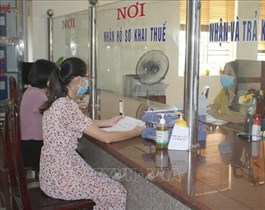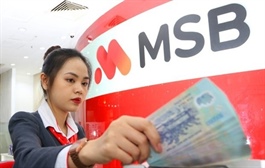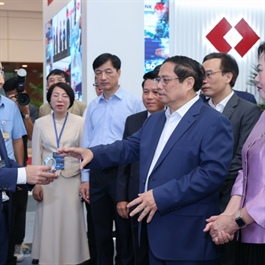Forex rate hike dampens business performance in Q1
Forex rate hike dampens business performance in Q1
The VND-USD exchange rate has risen 5.9 per cent so far this year, badly affecting the performances of a slew of businesses in the first quarter.

These firms tend to have large dollar-denominated loans or big import values, leading to them incurring foreign exchange losses and badly affecting the profit picture.
In Q1 of this year, Power Generation Corporation 3 (Genco 3) under state utility group Vietnam Electricity saw its post-tax profit contract by $27 million, whereas it counted $25.8 million in profit one year ago.
Besides the fact that the average electricity price during the period was lower compared to a year ago, resulting in a drop in the company’s power sales revenue, its foreign exchange losses amounted to $25.7 million in Q1, compared to $7.1 million profit in the same period last year.
At the end of Q1, Genco 3 reported $1.43 billion in loans, encompassing over $223 million in short-term and about $1.21 billion in long-term loans. The loans are mostly in US dollars, Chinese renminbi, and Japanese yen, and were used to expedite a raft of sizable hydro and thermal power plants.
For textile and apparel firms, state-run Vietnam Textile and Garment Group (Vinatex) bagged $164.8 million in net revenue in Q1, down 6 per cent on-year.
Thanks to cost-saving measures, Vinatex counted $14.3 million in accrued profit during the period, up 5 per cent on-year.
Member units under Vinatex, however, mostly have dollar loans for production and business activities.
With the surging forex rate, Vinatex incurred $1.9 million in foreign exchange losses during the period, double compared to one year ago.
Its post-tax profit during the period shed 35 per cent on-year, falling to a mere $1.52 million.
At private-held southern major Century Synthetic Fiber Corporation (STK), the company counted $11.07 million in revenue in Q1, down 8 per cent on-year, yet its accrued profit amounted to $13.4 million, almost double on-year thanks to cost-saving measures.
Foreign exchange losses during the period, however, reached $316,600, pulling the company’s post-tax profit to nearly $30,000 during the period, shedding 56 per cent on-year.
In the group of retailers, MobileWorld Investment Corporation (MWG), the number-one company in mobile and electronics retail, counted $4.25 million in foreign exchange losses in Q1 of this year, compared to zero in the same period last year.
Similarly, leading steelmaker Hoa Phat Group reported $9.62 million in implemented foreign exchange losses and $7.6 million from unimplemented foreign exchange losses in Q1.
As for national flag carrier Vietnam Airlines, in Q1 of this year the company incurred $32.1 million in foreign exchange losses, triple that from a year ago, driving its financial costs to $61.2 million, which was double compared to last year.
At PetroVietnam Drilling and Well Services Corporation (PV Drilling), foreign exchange losses in Q1 came to $2.2 million, up 83 per cent on-year.
Do Duc Chien, deputy chairman of PV Drilling, revealed that as the company has multiple loans in foreign currencies and most of its investments are counted in US dollars, the solution to restrict foreign exchange risks is negotiating with its partners to make USD payments and only shifting USD into VND when necessary, while striving to keep its USD balance at the highest possible level.
In addition, PV Drilling is using derivative products from the SBV to stabilise the greenback amid market volatility.
Vietcombank Securities JSC assumed that as the exchange rate pressure is eminent because the US Federal Reserve is keeping interest rates and the dollar index high, meanwhile the VND interest rate will remain low.
This means that the risk associated with incurring foreign exchange losses will last until the Fed moves towards lowering interest rates.
Experts forecast that the Fed will commence rate cuts in the second half of this year.




























